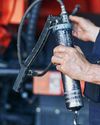試す 金 - 無料
Machinery Configuration
MACHINERY LUBRICATION INDIA
|May- June 2023
Quick Wins that Optimize Machine Performance

The landscape of manufacturing and industrial processes is constantly changing. Historically, titans of industry capitalized on large, cumbersome, overbuilt, sluggish equipment that had to be continuously maintained by a labor force that was paid an incredibly low wage. Modern industry is stressed to operate in a leaner landscape with fewer workers, purpose-built equipment and margins that, in many cases, are razor thin. This leads to improvement activities that get more and more out of less and less: more product and profit out of fewer people and with fewer failures or disruptions to business. In order to do this, practices and equipment both have to evolve to maintain pace with demands.
Fewer items are more scrutinized than the facility's physical assets; we have to make sure they perform how they are supposed to, when they are supposed to, and for however long they are supposed to. For this to happen, many factors have to be balanced, and often the equipment may not be capable of performing to this level in its current state. A higher state of configuration must be achieved — an optimum state that allows maintenance, operations and reliability to perform all necessary checks on the equipment without interrupting its service, all while maintaining or improving the inherent reliability of the piece of equipment.
このストーリーは、MACHINERY LUBRICATION INDIA の May- June 2023 版からのものです。
Magzter GOLD を購読すると、厳選された何千ものプレミアム記事や、10,000 以上の雑誌や新聞にアクセスできます。
すでに購読者ですか? サインイン
MACHINERY LUBRICATION INDIA からのその他のストーリー

MACHINERY LUBRICATION INDIA
PREDICT OIL USEFUL LIFE WITH REAL-TIME DATA
Oil is the life of any hydraulic or lubrication system.
8 mins
November – December, 2025

MACHINERY LUBRICATION INDIA
HOW THE RIGHT LUBRICATION TOOLS AND HARDWARE INFLUENCE MACHINE RELIABILITY
Having spent a good portion of my career around heavy machinery, both in the military and later in the civilian world, I’ve come to realize one critical fact: the tools you use matter just as much as the skills you have.
4 mins
November – December, 2025

MACHINERY LUBRICATION INDIA
Unlocking the Power of Oil Analysis & Particle Counting
Lubrication practices ensure peak performance and longev ity in machinery maintenance.
4 mins
November – December, 2025

MACHINERY LUBRICATION INDIA
BEYOND THE LABEL: UNDERSTANDING LUBRICANT TECHNICAL AND SAFETY DATA SHEETS
Over the years in lubrication, I have noticed that many professionals either overlook or misinterpret lubricant datasheets, especially Product Datasheets (PDS), which are key to selecting the proper lubricant. While Safety Datasheets (SDS) are widely known due to compliance requirements, the PDS holds the technical insights needed for informed decision-making. Yet, it is often misunderstood or ignored.
3 mins
November – December, 2025

MACHINERY LUBRICATION INDIA
SMART FILTRATION IN HEAVY INDUSTRIES:
PROTECTING WORKERS IN CEMENT AND STEEL MANUFACTURING
5 mins
November – December, 2025

MACHINERY LUBRICATION INDIA
IOCL & INFINEUM FORGE STRATEGIC LUBRICANT PARTNERSHIP
Infineum India and Indian Oil Corporation Limited (IOCL) have signed a strategic Memorandum of Understanding (MoU) aimed at deepening their collaboration to unlock long-term business value and drive innovation in India's mobility sector. The agreement was formalized at IOCL's Mumbai office, with Bakim Patra, Executive Director (Lubes) at IOCL, and Harshad Jambaulikar, General Manager of Infineum India, as the principal signatories.
1 min
November – December, 2025

MACHINERY LUBRICATION INDIA
CONTAMINATION REALIZATION: A CASE EXAMPLE AT A STEEL MILL
Condition monitoring, contamination control, lubrication excellence, and machine reliability are keywords that are often overused and misunderstood.
6 mins
November – December, 2025

MACHINERY LUBRICATION INDIA
BREAKING DOWN THE BASICS: A LESSON IN ASSET RELIABILITY
Before you go marching down to your reliability engineers and ask questions like, “What are the top 10 worst performing assets in our production line?”, it’s important to know the actual difference between an asset and reliability.
7 mins
November – December, 2025

MACHINERY LUBRICATION INDIA
EFFECTIVE USE OF THE PATCH TEST FOR SIMPLE ON-SITE ANALYSIS
The very best oil analysis programs incorporate some degree of onsite analysis. For most plants, mills, and mines, particle monitoring is the most productive onsite oil analysis activity available.
4 mins
November – December, 2025
MACHINERY LUBRICATION INDIA
CAFFEINE VS. CALM: FINDING THE RIGHT ENERGY BALANCE DURING WORK HOURS
For many of us, the workday doesn't officially begin until the first sip of coffee. In industrial and corporate settings alike, caffeine is often seen as a silent coworker, fueling early mornings, long shifts, and back-to-back meetings.
2 mins
November – December, 2025
Translate
Change font size
